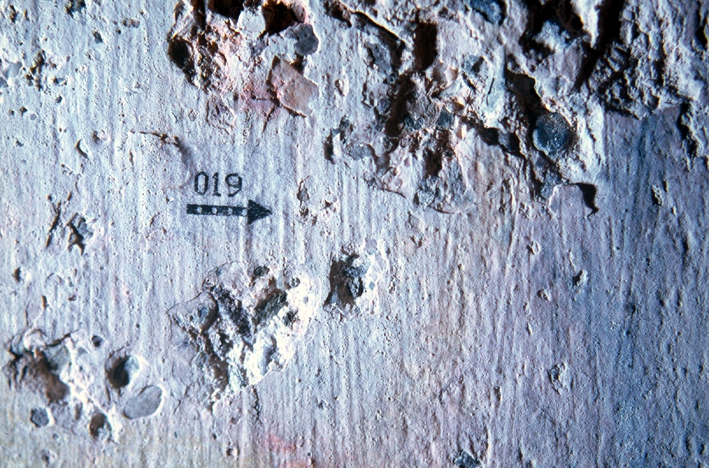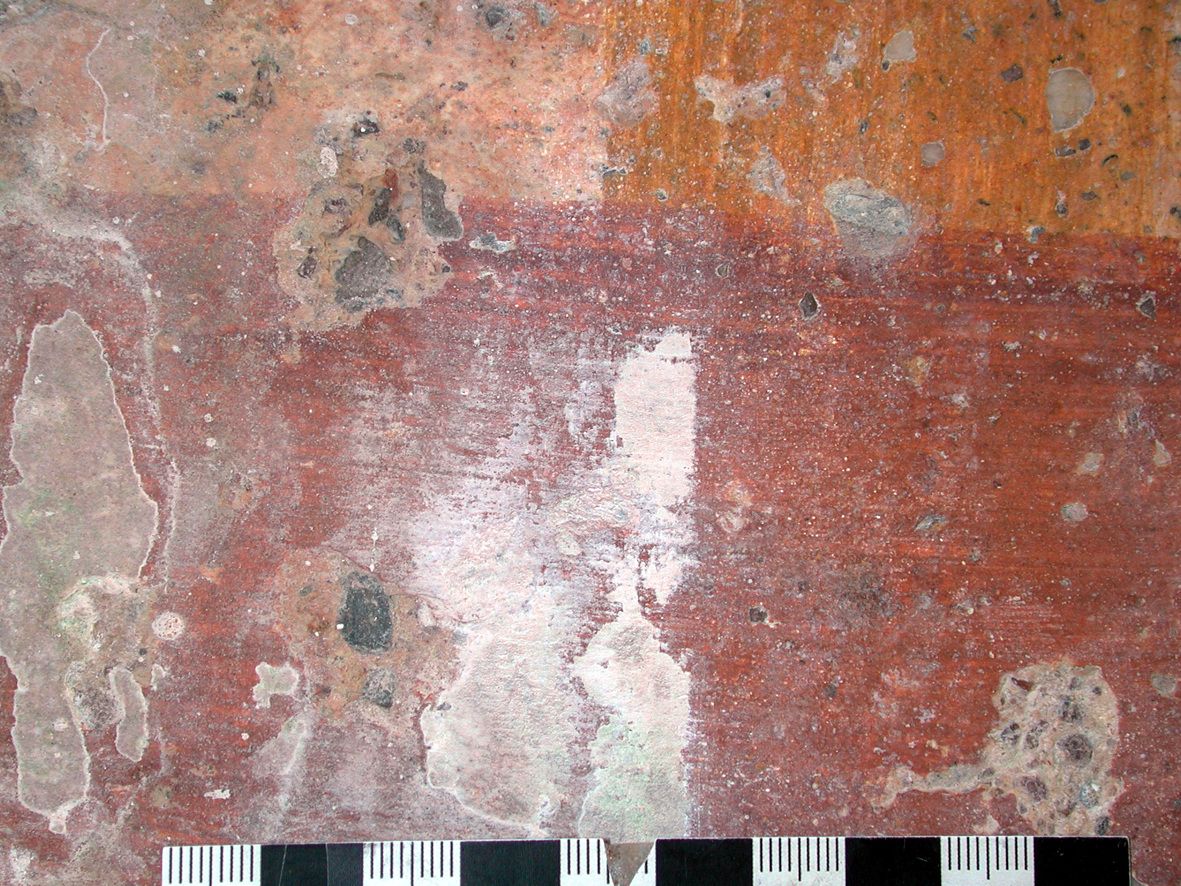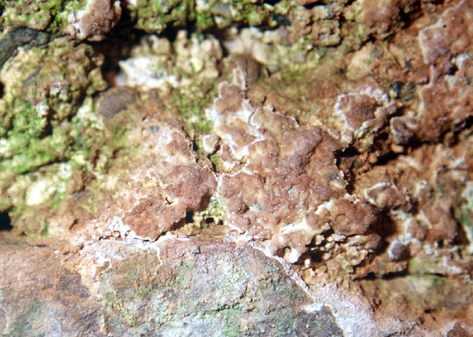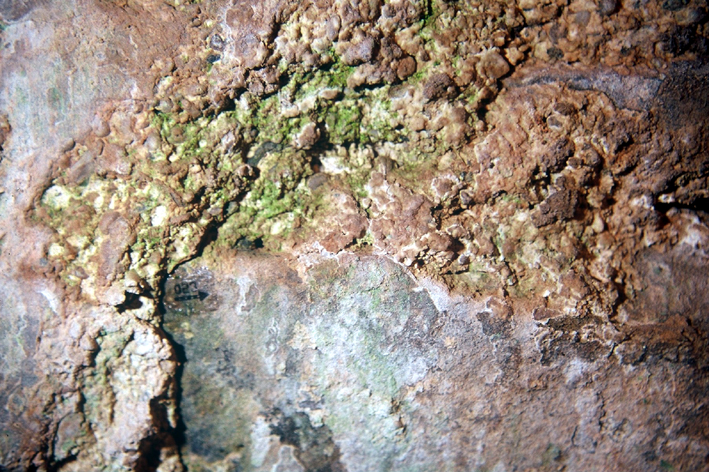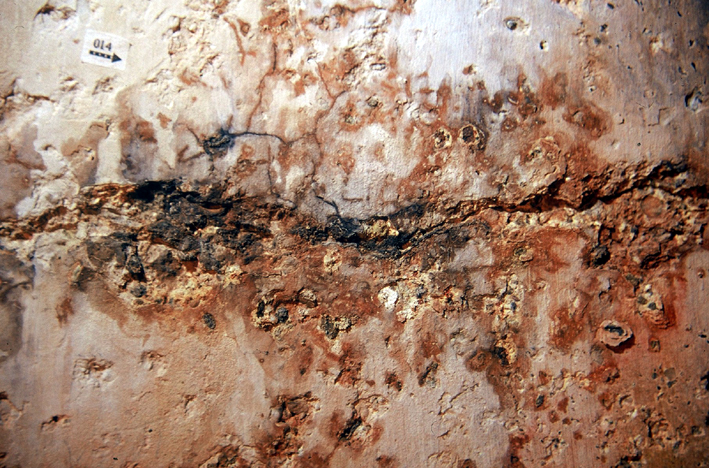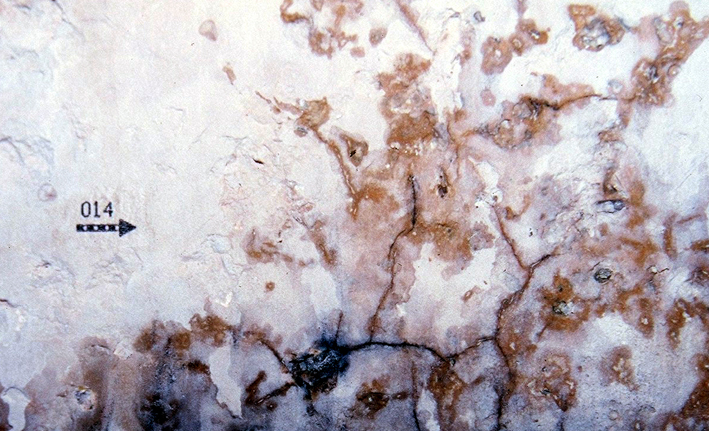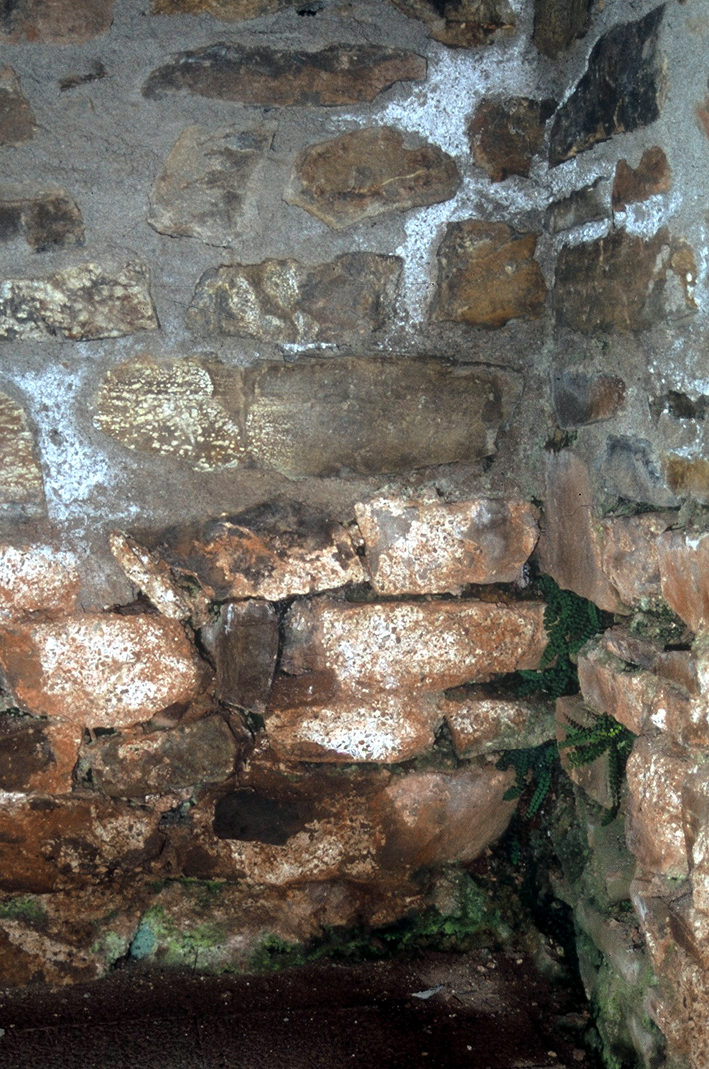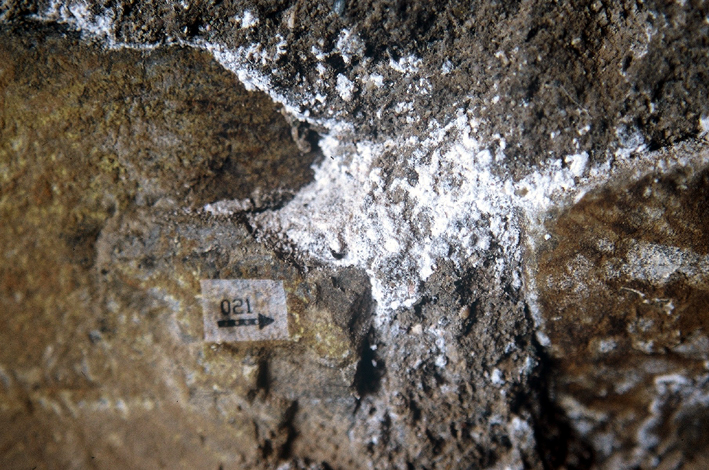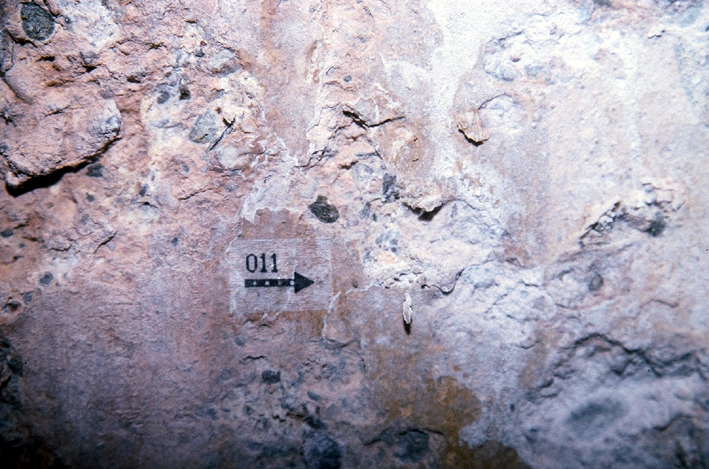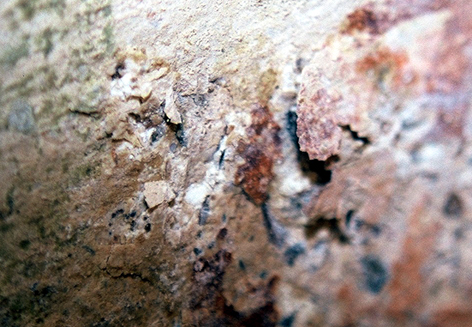Deterioration Patterns Wallpaintings: Difference between revisions
No edit summary |
|||
| (18 intermediate revisions by 3 users not shown) | |||
| Line 1: | Line 1: | ||
Author: [[user:NRiedl|Nicole Riedl]]<br> | Author: [[user:NRiedl|Nicole Riedl]]<br> | ||
<br> | <br> | ||
English Translation by [[user:Hschwarz|Hans-Jürgen Schwarz]] and[[user:SLeithaeuser|Sandra Leithäuser]]<br> | English Translation by [[user:Hschwarz|Hans-Jürgen Schwarz]] and [[user:SLeithaeuser|Sandra Leithäuser]]<br> | ||
back to [[ | back to [[Deterioration Patterns]] | ||
<br> | <br> | ||
== Examples of damage by salt | == Examples of damage by salt crystallization == | ||
== Calcareous concretions (sinter crusts) == | == Calcareous concretions (sinter crusts) == | ||
[[file:Nehren Kalksinterkruste.jpg|thumb|300px|left| Calcareous concretion, Roman wall-painting, grave chamber, Nehren]] | [[file:Nehren Kalksinterkruste.jpg|thumb|300px|left| Calcareous concretion, Roman wall-painting, grave chamber, Nehren]] | ||
[[file:Kalksinterkruste NWW Nehren.jpg|thumb|300px|right| Calcareous concretion, Roman wall-painting, grave chamber Nehren]] | [[file:Kalksinterkruste NWW Nehren.jpg|thumb|300px|right| Calcareous concretion, Roman wall-painting, grave chamber Nehren]] | ||
Precipitation of calcium carbonate on the surface of wall paintings begins by a fine white veil and may continue to form a white, dense calcareous concretion. It is characterized by | Precipitation of calcium carbonate on the surface of wall paintings generally begins by the formation of a fine white veil and may continue to form a white, dense calcareous concretion. It is characterized by its high stability and strong bonding with the painting. The water vapor permeability of the wall painting is reduced with the negative consequences that this may induce and the layered crust deposit(s) considerably affects their aesthetic appearance. | ||
<br clear=all> | <br clear=all> | ||
== | == Framboidal efflorescence (cauliflower crust) == | ||
[[file:Blumenkohlkruste Nehren NWW Detail.jpg|thumb|300px|left| | [[file:Blumenkohlkruste Nehren NWW Detail.jpg|thumb|300px|left|Framboidal efflorescence, grave chamber Nehren]] | ||
[[file:Blumenkohlkruste Nehren NWW.jpg|thumb|300px|right| | [[file:Blumenkohlkruste Nehren NWW.jpg|thumb|300px|right|Framboial efflorescence, grave chamber Nehren]] | ||
The formation of firmly adhering | The formation of firmly adhering framboidal efflorescence is characteristic for some conditions. The composition may consist of calcite (calcium carbonate) or gypsum (calcium sulfate dihydrate). Depending on the contaminants present, the efflorescence may appear whitish, yellowish, reddish or brownish. Biogenic material may be included within the crust deposits as they form. | ||
<br clear=all> | <br clear=all> | ||
== Hygroscopic salts == | == Hygroscopic salts == | ||
[[file:Gipskruste Hygroskopisch.jpg|thumb|300px|left|Gypsum crust | [[file:Gipskruste Hygroskopisch.jpg|thumb|300px|left|Gypsum crust and hygroscopic salts, grave chamber Nehren]] | ||
[[file:Salzkruste Hygroskopisch Nehren.jpg|thumb|300px|right|Gypsum crust | [[file:Salzkruste Hygroskopisch Nehren.jpg|thumb|300px|right|Gypsum crust and hygroscopic salts, grave chamber Nehren]] | ||
The photograph shows darkened areas along fissures in the paint layer and topcoat of the plaster that also has crust deposits on it. This is caused by the presence of hygroscopic salts that will tend to bind any moisture available in the plaster itself or originating from the ambient air. The moisture film will reflect light more giving the surface its darker appearance. | |||
<br clear=all> | <br clear=all> | ||
| Line 30: | Line 30: | ||
[[file:PulvrigeSalzkristalle-01.jpg|thumb|300px|left| Powdery salt efflorescence, sodium sulfate, grave chamber Nehren]] | [[file:PulvrigeSalzkristalle-01.jpg|thumb|300px|left| Powdery salt efflorescence, sodium sulfate, grave chamber Nehren]] | ||
[[file:PulvrigeSalzkristalle-Natriumsulfat.jpg|thumb|300px|right| Powdery salt efflorescence, sodium sulfate, grave chamber Nehren]] | [[file:PulvrigeSalzkristalle-Natriumsulfat.jpg|thumb|300px|right| Powdery salt efflorescence, sodium sulfate, grave chamber Nehren]] | ||
White, loosely adhering salt efflorescence on the plaster and the paint surface. | White, loosely adhering salt efflorescence on the plaster and the paint surface. It is characterized by small crystalline, soft, powdery efflorescence which may be formed by several different salts. The example shows sodium sulfate deposits on a repair plaster made with trass cement. | ||
<br clear=all> | <br clear=all> | ||
== Scaling due to salt | == Scaling due to salt crystallization == | ||
[[file:Schalenbildung Nehren-01.jpg|thumb|300px|left|Scaling, grave chamber Nehren]] | [[file:Schalenbildung Nehren-01.jpg|thumb|300px|left|Scaling, grave chamber Nehren]] | ||
[[file:Schalenbildung Nehren-02.jpg|thumb|300px|right|Scaling, grave chamber Nehren]] | [[file:Schalenbildung Nehren-02.jpg|thumb|300px|right|Scaling, grave chamber Nehren]] | ||
The crystallizing salts | The crystallizing salts can detach the paint layer and even the topcoat of the plaster. This occurs as a result of the liquid to solid phase transition during salt crystallization so that depending on where the salts crystals form, a thinner or a thicker layer may be detached. | ||
<br clear=all> | <br clear=all> | ||
[[Category:Riedl,Nicole]][[Category:Decay Pattern:Wall Paintings]] [[Category:R-HJuling]] [[Category:R-CBlaeuer]] [[Category: | [[Category:Riedl,Nicole]][[Category:Decay Pattern:Wall Paintings]] [[Category:R-HJuling]] [[Category:R-CBlaeuer]] [[Category:approved]] | ||
Latest revision as of 11:00, 18 November 2013
Author: Nicole Riedl
English Translation by Hans-Jürgen Schwarz and Sandra Leithäuser
back to Deterioration Patterns
Examples of damage by salt crystallization[edit]
Calcareous concretions (sinter crusts)[edit]
Precipitation of calcium carbonate on the surface of wall paintings generally begins by the formation of a fine white veil and may continue to form a white, dense calcareous concretion. It is characterized by its high stability and strong bonding with the painting. The water vapor permeability of the wall painting is reduced with the negative consequences that this may induce and the layered crust deposit(s) considerably affects their aesthetic appearance.
Framboidal efflorescence (cauliflower crust)[edit]
The formation of firmly adhering framboidal efflorescence is characteristic for some conditions. The composition may consist of calcite (calcium carbonate) or gypsum (calcium sulfate dihydrate). Depending on the contaminants present, the efflorescence may appear whitish, yellowish, reddish or brownish. Biogenic material may be included within the crust deposits as they form.
Hygroscopic salts[edit]
The photograph shows darkened areas along fissures in the paint layer and topcoat of the plaster that also has crust deposits on it. This is caused by the presence of hygroscopic salts that will tend to bind any moisture available in the plaster itself or originating from the ambient air. The moisture film will reflect light more giving the surface its darker appearance.
Powdery salt deposits[edit]
White, loosely adhering salt efflorescence on the plaster and the paint surface. It is characterized by small crystalline, soft, powdery efflorescence which may be formed by several different salts. The example shows sodium sulfate deposits on a repair plaster made with trass cement.
Scaling due to salt crystallization[edit]
The crystallizing salts can detach the paint layer and even the topcoat of the plaster. This occurs as a result of the liquid to solid phase transition during salt crystallization so that depending on where the salts crystals form, a thinner or a thicker layer may be detached.
